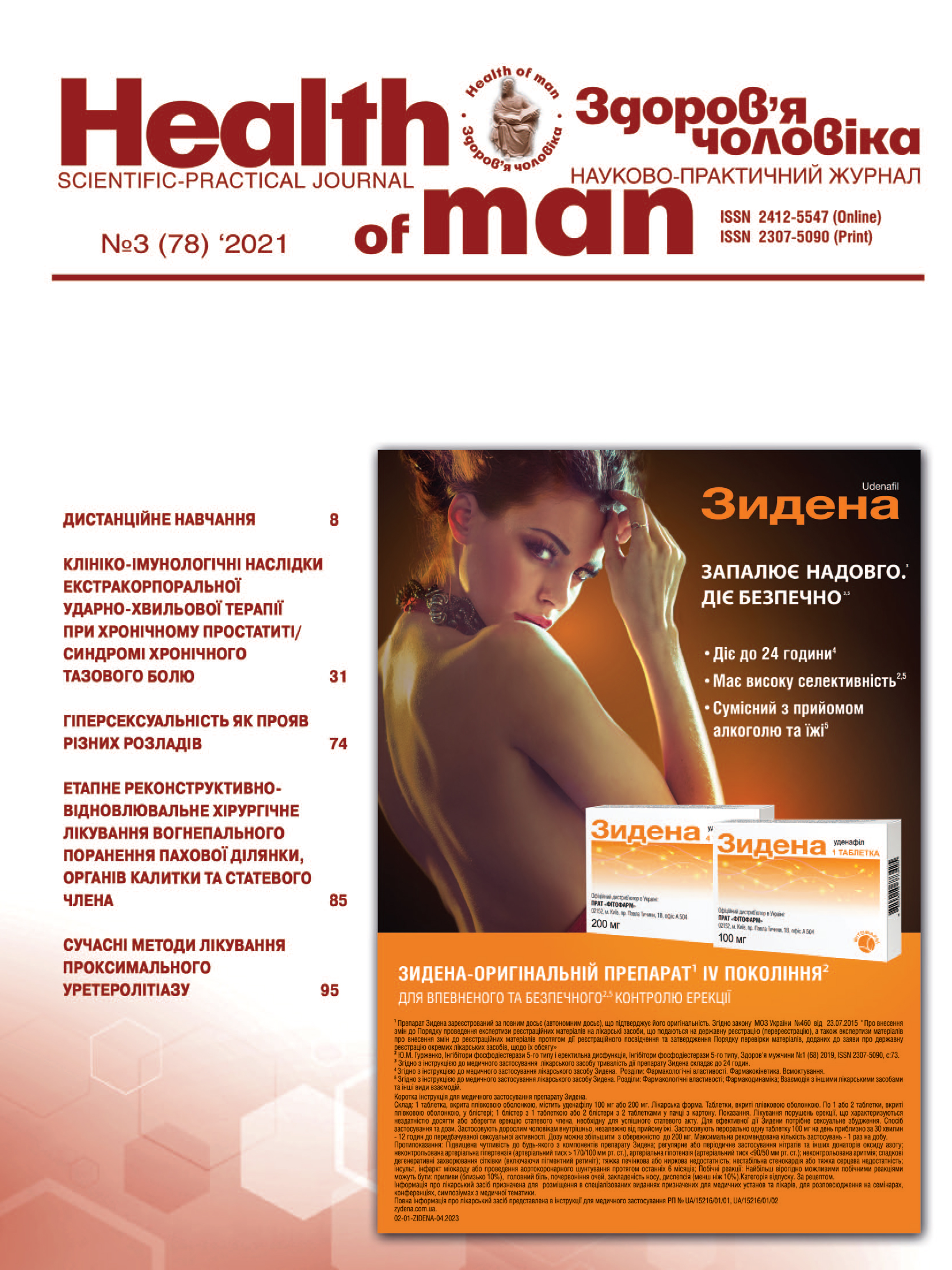MАR-test and Spermiological Research Indices
##plugins.themes.bootstrap3.article.main##
Abstract
Antisperm antibodies are detected in 3% to 25% of cases in men and women diagnosed with infertility. They can also be diagnosed in 1–10% of healthy fertile men. The presence of a high titer of AST is one of the factors of male infertility, which can be «hidden», i. e. not cause symptoms and deterioration of the overall spermogram.
The objective: to analyze the results of sperm testing in men with antisperm antibodies, which were detected by MAR-test.
Material and methods. A retrospective analysis of the examination results of 555 men was conducted on the basis of the Medical Center for Infertility Treatment in Chernivtsi. Spermograms were examined according to WHO recommendations in 2000, using an inverted microscope Olympus CKX41 in a Broker chamber. Determination of the percentage of sperm coated with antisperm antibodies was performed using the MAR-test (MAR-test, MAR-mixed antiglobulin reaction).
Results. If we calculate the percentage of patients in whom we assume the connection between the presence of antisperm antibodies and undertaken surgery, genital infections and allergy history, we get only 48.3% of cases. It has been found that most changes in sperm counts correlate with the percentage of sperm that are coated with IgG. These data indicate that increased IgG levels play an important role in the development of pathospermia. A negative medium-strength correlation was found between the percentage of Category A sperm and the percentage of IgG-coated sperm.
Persistence of IgG in semen is accompanied by a probable decrease in the morphological quality of sperm.
Conclusion. In 52% of patients it was not possible to establish the etiological factor for the presence of Ig in the ejaculate. It has been found that most changes in sperm counts correlate with the percentage of sperm that are coated with IgG. It has been determined that an increase in the level of IgA and IgG leads to a probable increase in the percentage of pathological sperm forms and decrease in sperm motility. In the presence of 30% of sperm that are coated with IgG, with a probability of 95%, the ejaculate of patients will have 100% of pathologicoalr mf s of sperm.
##plugins.themes.bootstrap3.article.details##

This work is licensed under a Creative Commons Attribution 4.0 International License.
Authors retain the copyright and grant the journal the first publication of original scientific articles under the Creative Commons Attribution 4.0 International License, which allows others to distribute work with acknowledgment of authorship and first publication in this journal.
References
Bozhedomov V.A., Rohklikov I.M., Tretyakov A.A., Lipatova N.A., Vinogradov I.V., Nikonov E.L. Topical problems of care rendered to childless couples with male factor infertility: сlinical, organizational, and methodical aspects. Andrology and Genital Surgery. 2013;14(4):7-16. (In Russ.) Available from: https://doi.org/10.17650/2070-9781-2013-4-7-16
Ibishev Kh.S., Mamedov E.А., Magomedov G.А. The immunological aspects of male infertility: 2016–2020 literature review. Urology Herald. 2020;8(3):97-102. (In Russ.). Available from: https://doi.org/10.21886/2308-6424-2020-8-3-97-102
Khan G-AN, Agarwal DK, Rabbani T. Antisperm antibody as a cause of immunological infertility in males. Journal of Advance Researches in Biological Sciences. 2012;4(1):1-4.
Cui D, Han G, Shang Y, Liu C, Xia L, Li L et al. Antisperm antibodies in infertile men and their effect on semen parameters: A systematic review and meta-analysis. Clinica Chimica Acta. 2015;444:29-36.
Vickram AS, Dhama К, Chakraborty, Samad, Latheef, Sharun et al. Role of Antisperm Antibodies in Infertility, Pregnancy, and Potential forContraceptive and Antifertility Vaccine Designs: Research Progress and Pioneering Vision. Vaccines. 2019;7(3):116.
Lombardo F, Gandini L, Lenzi A, Dondero F. Antisperm immunity in assisted reproduction. Journal of Reproductive Immunology. 2004;62(1-2):101-109.
Pochernikov D.G., Gerasimov A.M., Guseinova S.G., Naumov N.P. Elevated level of antisperm antibodies as a risk factor for unfavorable pregnancy outcome after use of assisted reproductive technology. Andrology and Genital Surgery. 2019;20(1):69-74. (In Russ.) Available from: https://doi.org/10.17650/2070-9781-2019-20-1-69-74





